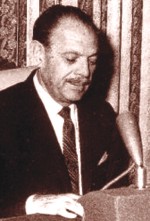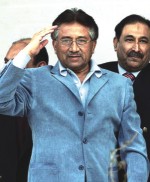|
Musings
All those dictators in Pakistan
Syed Badrul Ahsan
 |
General Ayub Khan |
General Pervez Musharraf has lately been doing a whole lot of things in Pakistan that has left people everywhere somewhat concerned about the psychology that works in dictators. There is hardly anything new here, you might suggest, about the thoughts that often assail men who seize power unconstitutionally. And you may be right, of course. Even so, it does send shivers down your spine when you note the alacrity with which Musharraf has sent a whole phalanx of judges, thirty seven in all, packing. And the general feels not a bit of shame in committing the act. But whoever said men who seize the state through means other than the constitutional have ever felt embarrassed about what they do? Not even the fact that his old enemies, Benazir Bhutto and Nawaz Sharif, people he was determined should stay out of Pakistan, have now come back home does not make Musharraf go red in the face. And did you notice the tearful way in which he gave up command of the army? If he had had his way, and if western pressure were not there, he would have stayed on. But then, it is the gods who decide the fate of the earth. And the earth, if we will recall, has always been home to some of the most unscrupulous of men.
Think back on General Ayub Khan. To be sure, he called himself a field marshal, though his detractors (and they were legion) never thought of him as anything other than a crude coup maker. He truly thought he was a messiah coming to deliver Pakistan from its wrangling politicians. And so what did he do? He simply enacted a law he called the Elective Bodies Disqualification Ordinance (EBDO) and brusquely told political leaders across Pakistan that they could not pursue their profession any more. He locked up many of them and then went on to seize half the Muslim League in his attempt to civilianise himself. A certain change came into his demeanour. He suddenly decided to wear a suit topped by a Jinnah cap positioned slightly askance on his head. And then, one fine day, he, Khwaja Shahabuddin and Abdul Monem Khan decided that Rabindranath Tagore was of small consequence and so could be banished from the lives of Pakistan's Bengalis. He tried to destroy Sheikh Mujibur Rahman and ended up being himself destroyed.
Ayub Khan left office in disgrace. It was pretty ironic that he came to power through making use of the army and then walked away from power through handing the baton over to the army again. He did not have the decency to ask the speaker of his rubber stamp national assembly, Abdul Jabbar Khan, to take charge as acting president of Pakistan. But if Ayub's departure was disgraceful, that of his successor was simply a scandal. General Agha Mohammad Yahya Khan eerily presided over an unprecedented defeat of Pakistan's army in war and saw the eastern wing of the country wage a guerrilla war to become the sovereign nation of Bangladesh in 1971. Any man with even the slightest sense of morality would have quit immediately after such realities came to pass. But Yahya tried to hang on. A day after East Pakistan breathed its last, he went on the electronic media to tell dumbstruck Pakistanis (who themselves had never believed their army was actually a bunch of murderers and rapists) that the battle would go on. The chief of army staff, General Abdul Hamid Khan, was pelted with humiliation when he tried explaining away the disaster in Dhaka before a conference of military officers in Rawalpindi.
 Yahya Khan spent his remaining years, nine altogether, blaming everyone except himself for the tragedy in Bangladesh. Much later came the revelation that he had kept a journal after the war. And throughout the length and breadth of it he had blamed Bhutto for the making of the crisis. He even suggested that it was Bhutto who had proposed, in October 1971, that Sheikh Mujibur Rahman be hanged in order for democracy to be set in motion in Pakistan. Of course, Bhutto told Bangabandhu, when they met in late December 1971, that he had saved the Bengali leader from being hanged by Yahya Khan. See the point? Both Yahya and Bhutto were in league against the Bengalis and, as is generally the case when conspiracies fall through, they blamed each other for all the things that had gone wrong. Yahya Khan spent his remaining years, nine altogether, blaming everyone except himself for the tragedy in Bangladesh. Much later came the revelation that he had kept a journal after the war. And throughout the length and breadth of it he had blamed Bhutto for the making of the crisis. He even suggested that it was Bhutto who had proposed, in October 1971, that Sheikh Mujibur Rahman be hanged in order for democracy to be set in motion in Pakistan. Of course, Bhutto told Bangabandhu, when they met in late December 1971, that he had saved the Bengali leader from being hanged by Yahya Khan. See the point? Both Yahya and Bhutto were in league against the Bengalis and, as is generally the case when conspiracies fall through, they blamed each other for all the things that had gone wrong.
One would have thought that the humiliation of the Pakistan army in Bangladesh would have embarrassed it enough to make it stay in the barracks and launch no more moves to commandeer the state. But less than six years later, General Ziaul Huq, the man Bhutto publicly described as his monkey general (and that gives you one of many clues about Bhutto's own perverted sense of morality), ousted Pakistan's first elected government and went on to govern by decree for eleven years. He identified himself with Islam, called his system Nizam-e-Mustafa, and had soldiers go around landing lashes on the back of anyone who dared to question the sordid acts of his regime. Not even an avalanche of mercy appeals would stay his hand when it came to hanging Zulfikar Ali Bhutto. And then came a day when Ziaul Huq died amid an explosive crate of mangoes in an aircraft that simply burst and disintegrated in the skies over Bahawalpur. That was in 1988. There were hardly any Pakistanis who mourned his passing. These days his son Ejazul Huq is a minister and quite an irritant for all liberal and well-meaning Pakistanis. Remember it was Ejaz who, as religious affairs minister, tried to have Pakistanis' religious identities stamped on their passports until he was booed into retreat?
Ah, it is forever a fascinating experience reflecting on all the queer things Pakistan's generals, those in power and those along the periphery of it, have done in their narrow selfish interests. Aslam Beg could not launch a coup, but when you hear him talk, you have a feeling he regrets not having had his own brand of martial law. Tikka Khan, having despatched millions of Bengalis to their graves, joined the People's Party and ended up being governor of the Punjab. Amir Abdullah Khan Niazi, a clear buffoon asked to command soldiers, wept as the joint Indo-Bangladesh forces approached Dhaka in December 1971. Back in Pakistan from the POW camps in India, he spent the rest of his life as a strange study in shamelessness. Others, not he --- said he --- had 'lost' East Pakistan. Rao Farman Ali survived shame and became a minister in the Zia regime.
The long tale of Pakistan's generals continues. Who knows if and when General Ashfaq Pervez Kiyani, Pakistan's new army chief, will strike?
Copyright
(R) thedailystar.net 2007 |
